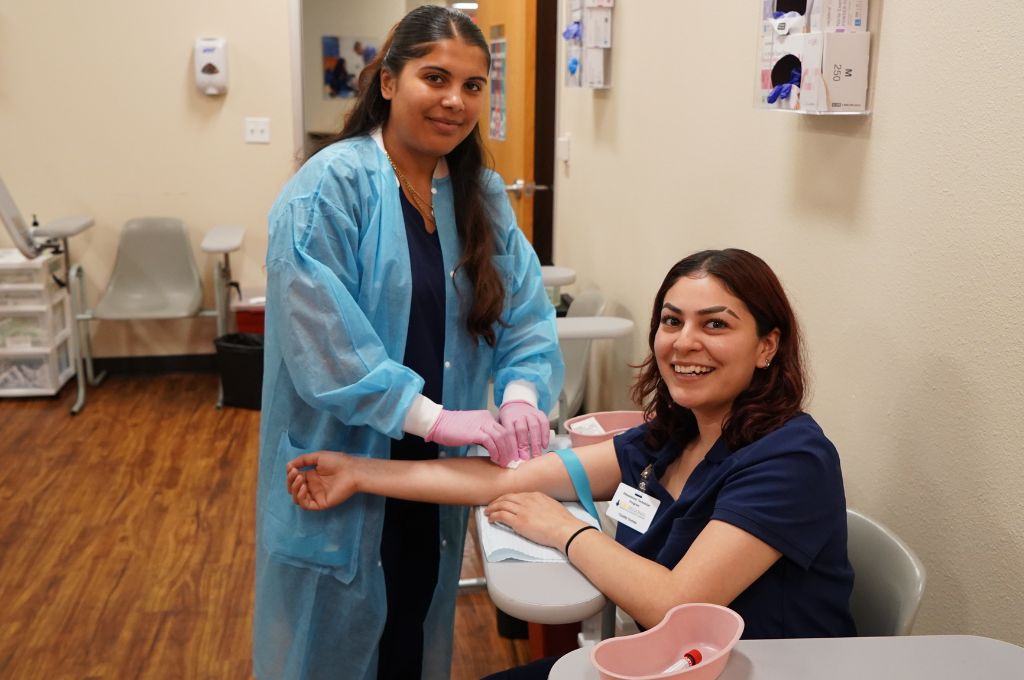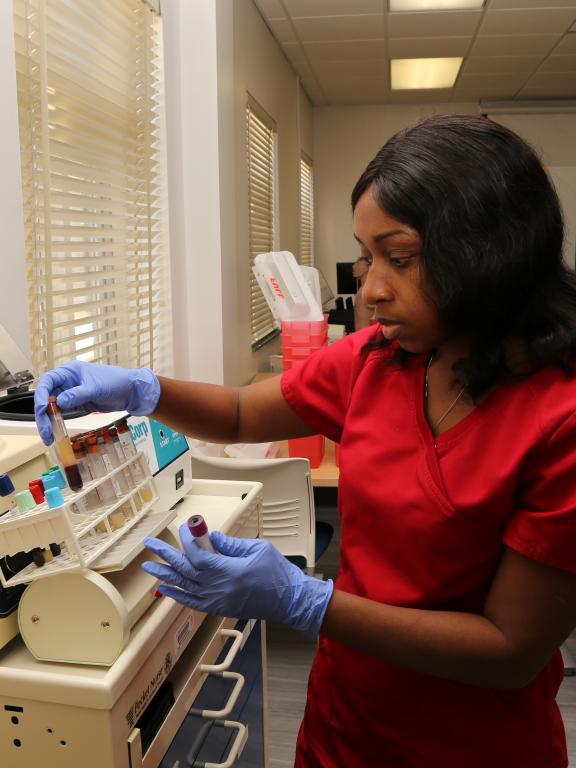How Phlebotomy Courses Near Me Can Fast-Track Your Entry into the Healthcare Field
How Phlebotomy Courses Near Me Can Fast-Track Your Entry into the Healthcare Field
Blog Article
The Path to Qualification: Recognizing the Phlebotomy Educating Course Trip and Its Importance
As you think about the path to qualification in phlebotomy, it is very important to understand the role you'll play in medical care. Your training will certainly cover crucial abilities, from blood collection methods to patient interaction. Each component of the program prepares you for the difficulties in advance. What specifically does the journey require, and why is accreditation so crucial for your future job? Allow's explore these questions better.

The Role of Phlebotomists in Healthcare
Phlebotomists play a crucial duty in the health care system, acting as the vital web link between people and necessary diagnostic testing. You'll execute blood draws, ensuring examples are collected properly and safely. Your knowledge helps in identifying medical problems, keeping track of wellness, and leading treatment choices.
In your daily communications, you'll need to develop count on with people, making them feel comfy during what may be a stressful experience. You're liable for labeling and taking care of examples carefully to prevent contamination or mistakes, which could affect test results.
Yet, you'll frequently work together with physicians and nurses, communicating crucial information concerning patients' conditions. Your duty is basic in keeping the process in medical care settings, guaranteeing timely and precise outcomes. By understanding your skills, you contribute meaningfully to individual treatment, making you an important component of the clinical group. Embracing this obligation is crucial to your success as a phlebotomist.
Review of Phlebotomy Training Programs
When exploring phlebotomy training programs, you'll find various types designed to fit different schedules and learning styles. Each program helps you develop important skills like blood collection and patient interaction. Understanding these options is key to picking the appropriate course for your job.
Kinds Of Educating Programs
Several kinds of training programs are available for those looking to come to be skilled in phlebotomy. Additionally, some healthcare facilities and clinics use on-the-job training programs, offering sensible experience while you learn. Whatever course you choose, each program aims to outfit you with the required abilities for a successful phlebotomy occupation.

Trick Skills Established
Mastering phlebotomy requires a collection of essential abilities that are established with thorough training programs. Additionally, communication skills are fundamental; you'll require to engage with clients, describe treatments, and put them at convenience. Each of these skills is crucial for your success as a qualified phlebotomist, making you a useful possession in any type of medical care setting.
Key Elements of a Phlebotomy Training Course
In a phlebotomy program, you'll concentrate on vital subjects that prepared for your future profession. You'll involve in hands-on training that permits you to apply what you have actually found out in real-world setups. Both the curriculum and useful experience are essential for your success as a phlebotomist.
Core Educational Program Review
While pursuing a phlebotomy training course, you'll experience a curriculum developed to outfit you with essential abilities and knowledge. Phlebotomy school. This curriculum generally includes makeup and physiology, concentrating on the blood circulation system and comprehending blood components. You'll likewise find out about various kinds of blood collection techniques, including venipuncture and capillary slit strategies
In addition, infection control and security protocols are necessary elements, ensuring you know just how to keep a sterilized atmosphere. You'll examine patient communication, highlighting communication and compassion, which are crucial for alleviating client stress and anxiety. Ethical and legal considerations will be resolved, preparing you for real-world duties. This fundamental knowledge will certainly allow you to succeed as a phlebotomist and provide high quality treatment in professional setups.
Hands-On Training Experience
Obtaining hands-on experience is an essential component of your phlebotomy training course. This practical training allows you to apply what you have actually discovered in a real-world setting, boosting your abilities and confidence. Phlebotomy school.
Additionally, you'll obtain the possibility to communicate with patients, which is important for developing your interaction skills. This mix of technical proficiency and interpersonal abilities is crucial for your success as a certified phlebotomist. Ultimately, hands-on training is where theory meets practice, solidifying your understanding and preparedness for qualification.
Certification and Licensing Demands
Before you can begin your job in phlebotomy, it is essential to recognize the accreditation and licensing needs that differ by state. Many states call for phlebotomists to hold a certification from an identified organization, such as the National Phlebotomy Association or the American Culture for Clinical Pathology. These qualifications normally entail passing a test that examines your understanding and skills in the field.
In addition to accreditation, some states have certain licensing demands. You may require to finish a particular number of hours in professional practice, send evidence of training, or go through a history check. It is essential to investigate your state's regulations to make certain you fulfill all needed criteria.
Remaining notified regarding these needs not just aids you protect a placement but likewise enhances your credibility as a professional. By satisfying these demands, you'll be well on your means to an effective profession in phlebotomy.
Hands-On Training and Practical Experience
Hands-on training and sensible experience are essential elements of your phlebotomy education and learning, as they allow you to use academic expertise in real-world situations. Throughout your training, you'll engage in supervised venipuncture, find out appropriate methods, and become acquainted with different blood collection devices. This straight involvement is critical for building your self-confidence and sharpening your abilities.
You'll function closely with skilled experts who can lead you through the nuances of client interaction and example handling. Each session not just enhances your understanding however additionally prepares you for the hectic environment of healthcare settings.
Additionally, several programs integrate scientific turnings, permitting you to experience varied setups, from hospitals to outpatient clinics. This direct exposure aids you adapt to different difficulties and individual requirements, guaranteeing you're well-prepared for your future function. Embrace these chances, as they're vital to becoming Phlebotomy Classes Near Me an experienced and compassionate phlebotomist.
Obstacles Encountered During Training
While acquiring hands-on experience is necessary, it's essential to recognize the obstacles that can occur during your phlebotomy training. In addition, grasping the skills needed for blood attracts takes method; you may struggle with method initially.
Time monitoring can likewise be a difficulty, as balancing concept, sensible sessions, and personal dedications can feel daunting. You might encounter varying finding out speeds among your peers, leading to feelings of insecurity if you assume you're falling back. Lastly, adjusting to the various personalities of teachers can be difficult, as each might have an unique mentor design.
Acknowledging these barriers beforehand can prepare you for success and aid you develop resilience throughout your training journey.
Occupation Opportunities After Qualification

As you get experience, you may also think about focusing on locations like pediatric or senior citizen phlebotomy, accommodating details individual requirements. Some phlebotomists select to advance their jobs by becoming lab specialists or seeking further education in medical care fields.
Furthermore, your accreditation can bring about duties in training or managing new phlebotomists, allowing you to share your expertise. With the healthcare market constantly growing, your skills will always be in demand, paving the way for a stable and fulfilling job. Embrace the possibilities waiting for you!
Frequently Asked Concerns
What Is the Typical Period of a Phlebotomy Training Course?
Phlebotomy training courses usually last around 4 to eight weeks. You'll involve in hands-on method, classroom guideline, and on-line discovering. Finishing this training prepares you for qualification and a rewarding job in medical care.
Are Online Phlebotomy Courses Available?
Yes, online phlebotomy training courses are readily available. They supply adaptability and comfort, enabling you to study at your very own pace. Just verify the program is approved to meet accreditation demands and acquire beneficial skills for your profession.
Just How Much Does Phlebotomy Training Normally Expense?
Phlebotomy training generally costs in between $700 and $2,500, depending upon the program and place. You ought to take into consideration variables like course size, included products, and hands-on experience when picking the ideal training for you.
What Prevail Prerequisites for Phlebotomy Training?
Usual prerequisites for phlebotomy training commonly consist of a high college diploma or GED, booster shots, and a history check. Some programs might likewise need standard health care knowledge or qualifications, ensuring you're planned for hands-on training.
Can I Work While Completing My Phlebotomy Training?
Yes, you can work while finishing your phlebotomy training. Lots of trainees balance jobs with their research studies, yet make sure to handle your time successfully to guarantee you satisfy both job and training commitments efficiently.
Report this page